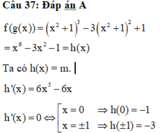Timf m để g(x)=3x4+x2-x+m nhận x=-1 là 1 nghiệm
Hãy nhập câu hỏi của bạn vào đây, nếu là tài khoản VIP, bạn sẽ được ưu tiên trả lời.


Vì g(x) nhận x = -1 là nghiệm nên
g(-1) = 0 ⇒ m + 3 + 2 = 0 ⇒ m = -5
Chọn A

2: \(\text{Δ}=\left(m-4\right)^2-4\left(-m+3\right)\)
\(=m^2-8m+16+4m-12\)
\(=m^2-4m+4=\left(m-2\right)^2>=0\)
Do đó: Phương trình luôn có hai nghiệm với mọi m
Theo đề, ta có hệ phương trình:
\(\left\{{}\begin{matrix}3x_1-x_2=2\\x_1+x_2=-m+4\end{matrix}\right.\Leftrightarrow\left\{{}\begin{matrix}4x_1=6-m\\x_2=3x_1-2\end{matrix}\right.\)
\(\Leftrightarrow\left\{{}\begin{matrix}x_1=\dfrac{6-m}{4}\\x_2=\dfrac{3\left(6-m\right)}{4}-2=\dfrac{18-3m-8}{4}=\dfrac{10-3m}{4}\end{matrix}\right.\)
Theo đề, ta có: \(x_1x_2=-m+3\)
\(\Leftrightarrow\left(m-6\right)\left(3m-10\right)=16\left(-m+3\right)\)
\(\Leftrightarrow3m^2-30m-18m+60+16m-48=0\)
\(\Leftrightarrow3m^2-32m+12=0\)
\(\text{Δ}=\left(-32\right)^2-4\cdot3\cdot12=880>0\)
Do đó: Phương trình có hai nghiệm phân biệt là:
\(\left\{{}\begin{matrix}x_1=\dfrac{32-4\sqrt{55}}{6}=\dfrac{16-2\sqrt{55}}{3}\\x_2=\dfrac{16+2\sqrt{55}}{3}\end{matrix}\right.\)

ĐKXĐ: \(x\ge0\)
\(\left(x^2-x-m\right)\sqrt{x}=0\)
\(\Leftrightarrow\left[{}\begin{matrix}x=0\\x^2-x-m=0\left(1\right)\end{matrix}\right.\)
Giả sử (1) có nghiệm thì theo Viet ta có \(x_1+x_2=1>0\Rightarrow\left(1\right)\) luôn có ít nhất 1 nghiệm dương nếu có nghiệm
Do đó:
a. Để pt có 1 nghiệm \(\Leftrightarrow\left(1\right)\) vô nghiệm
\(\Leftrightarrow\Delta=1+4m< 0\Leftrightarrow m< -\dfrac{1}{4}\)
b. Để pt có 2 nghiệm pb
TH1: (1) có 1 nghiệm dương và 1 nghiệm bằng 0
\(\Leftrightarrow m=0\)
TH2: (1) có 2 nghiệm trái dấu
\(\Leftrightarrow x_1x_2=-m< 0\Leftrightarrow m>0\)
\(\Rightarrow m\ge0\)
c. Để pt có 3 nghiệm pb \(\Leftrightarrow\) (1) có 2 nghiệm dương pb
\(\Leftrightarrow\left\{{}\begin{matrix}\Delta=1+4m>0\\x_1x_2=-m>0\\\end{matrix}\right.\) \(\Leftrightarrow-\dfrac{1}{4}< m< 0\)

Lời giải:
Ta thấy: $x^2-3x+2=(x-1)(x-2)$. Do đó để $f(x)$ chia hết cho $g(x)$ thì $f(x)\vdots x-1$ và $f(x)\vdots x-2$
Tức là $f(1)=f(2)=0$ (theo định lý Bê-du)
$\Leftrightarrow 3-2+(a-1)+3+b=3.2^4-2.2^3+(a-1).2^2+3.2+b=0$
$\Leftrightarrow a+b=-3$ và $4a+b=-34$
$\Rightarrow a=\frac{-31}{3}$ và $b=\frac{22}{3}$

a.Bạn thế vào nhé
b.\(\Delta=3^2-4m=9-4m\)
Để pt vô nghiệm thì \(\Delta< 0\)
\(\Leftrightarrow9-4m< 0\Leftrightarrow m>\dfrac{9}{4}\)
c.Ta có: \(x_1=-1\)
\(\Rightarrow x_2=-\dfrac{c}{a}=-m\)
d.Theo hệ thức Vi-ét, ta có:
\(\left\{{}\begin{matrix}x_1+x_2=-3\\x_1.x_2=m\end{matrix}\right.\)
1/ \(x_1^2+x_2^2=34\)
\(\Leftrightarrow\left(x_1+x_2\right)^2-2x_1x_2=34\)
\(\Leftrightarrow\left(-3\right)^2-2m=34\)
\(\Leftrightarrow m=-12,5\)
..... ( Các bài kia tương tự bạn nhé )

\(\Delta=\left(-2m\right)^2-4\left(m^2-m+1\right)\)
=4m^2-4m^2+4m-4=4m-4
Để (1) có 2 nghiệm thì 4m-4>=0
=>m>=1


Ta có
g(x)=3x^4+x^2-x+m
x=-1 là nghiệm của g(x)
=>g(1)=3.(-1)^4+(-1)^2-(-1)+m=0
=>5+m=0
=>m=-5
Vậy m=-5 thoả mãn